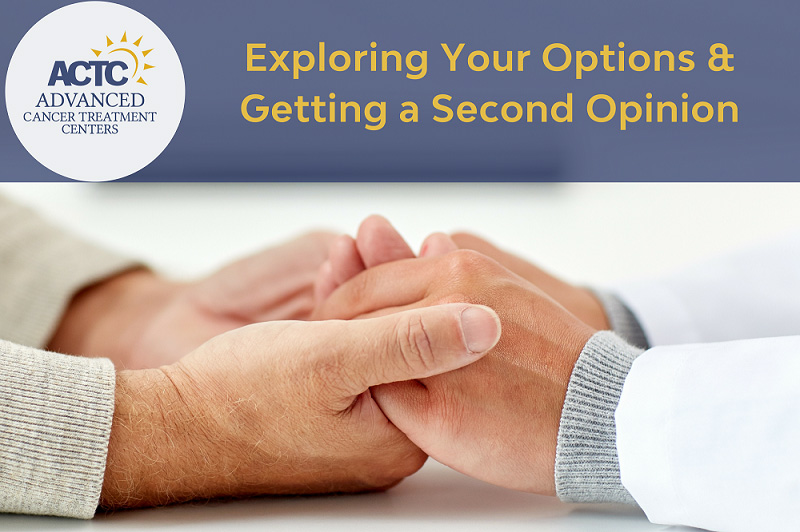
Book a Consultation
Thank you!
Your form has been sent successfully.



March 25, 2021
The moment you’re diagnosed with cancer, your entire world turns upside down. It’s common to have more questions than answers and to seek the qualified second opinion of an expert Oncologist can help alleviate some of the concerns.
Second opinions are very common. A 1999 analysis of the National Health Interview Survey database showed that over 50% of cancer survivors sought second opinions from another physician. A variety of factors may be influencing your motivation for seeking counsel with a new doctor. The uncertainty of your diagnosis, as well as complications or risk involved in a proposed treatment plan are common concerns.
A 2014 review of general patient-initiated second opinions found that second opinions often confirm the initial diagnosis. In some situations, the second physician may recommend an alternative treatment plan. Although there is insufficient evidence to suggest that second opinions reduce errors in diagnosis, It should be noted however that patients that have obtained a 2nd opinion felt more confident in there decision making as well as their Oncologist’s.
Whatever the reason, you should take your time making any big decisions and utilize all the resources at your disposal.
Before you start making appointments, reach out to your insurance provider. They can help connect you with doctors that accept your plan and explain what your policy covers so you can make more informed decisions about your selection of a new physician. You can also find information on every licensed physician in the United States at the American Medical Association’s DoctorFinder.
You may be nervous about even discussing a second opinion with your doctor, but there’s really no reason to be. As mentioned previously, looking for a second opinion is very common and your doctor will want what’s best for your health. They may be able to provide you with support, referral, and care in executing whatever treatment plan you decide on.
Your new doctor will require as much information as possible about your initial diagnosis before they can counsel you on a second opinion. You may have to contact multiple offices and facilities to obtain all of this information. In most cases, you will need to call your doctor’s office or hospital and request copies or access to your records online via a portal. Before your appointment, make sure you have:
As you examine your case with your new physician, you’ll be exposed to a lot of information you may not be entirely capable of comprehending. You may hear words and phrases that you aren’t familiar with, or be asked to follow concepts that are difficult enough to understand in even the best circumstances.
There are usually pamphlets and information packets available to provide information regarding specific cancer diagnosis, but it’s normal to be inquisitive and want to know more about how everything applies to you.
Before you meet, have a plan of action for gathering the most pertinent information; bring a list of questions you would like your doctor to address and take notes as they offer their interpretation of your results. Some great questions to ask include:
“How does your opinion differ from my previous physician’s diagnosis and treatment plan?”
“What steps did you take to arrive at your interpretation?”
“Is it possible for you to review my case with my previous physician?”
“What do you usually recommend to patients like me?”
“Are there clinical trials available ?”
If you think it might be helpful and your physician will allow it, recording your meetings is a great idea. Bringing a family member or friend to help make sense of it all isn’t a bad idea either, especially if they’re someone who can offer you continued support throughout your treatment.
Your doctor (or team of doctors) will be instrumental in helping you understand your case, but you may feel the need to do your own research. It’s important to get your information on treatment guidelines from a trusted source such as The American Cancer Society, as the internet is rife with misinformation. Avoid sources that make unverified claims regarding cures and alternative treatments.
Sometimes, it can be helpful to connect with cancer survivors and learn about their personal experiences with treatment and how they came to their decisions for choosing a plan. The American Society of Clinical Oncology has an approved list of support groups you can join to reach survivors and hear their stories. As always, it’s best to address your questions and concerns with a qualified physician.


January 07, 2026
A chemo port is a small device placed under your skin that makes recei...
KNOW MORE

December 24, 2025
It's natural to wonder if testosterone replacement therapy (TRT) is sa...
KNOW MORE

December 24, 2025
A rash that will not calm down is scary, especially when it changes or...
KNOW MORE

December 24, 2025
Florida’s lung cancer burden remains significant and affects many fa...
KNOW MORE

December 24, 2025
A partial hysterectomy, also called a supracervical hysterectomy, is s...
KNOW MORE

December 24, 2025
Finding a rash on your breast can be unsettling, but remember, many ra...
KNOW MORE
